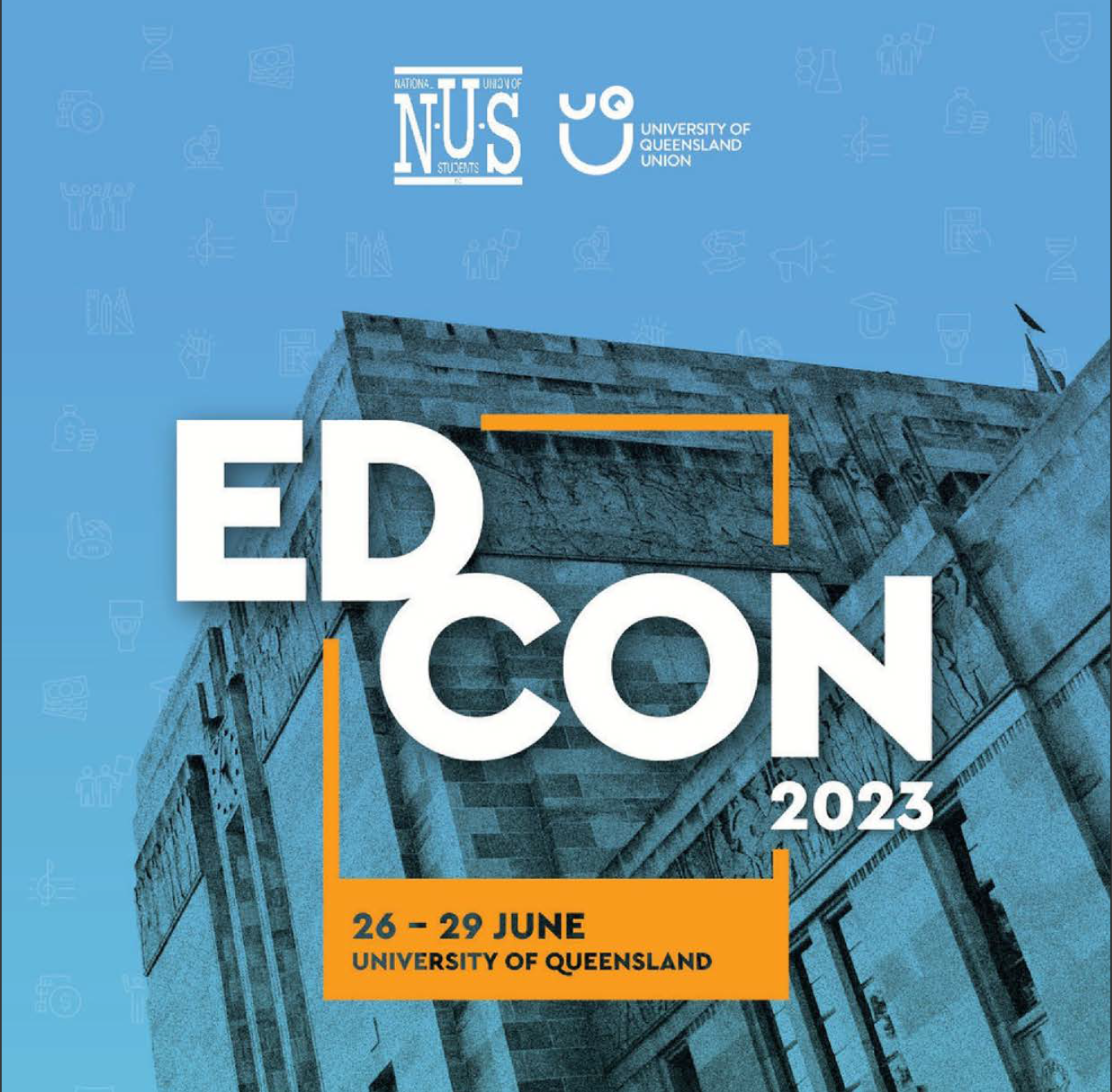We are all getting a bit worn out, but to the credit of all, Edcon once again descended on UQ to more drama and yelling. Welcome to the Tertangala’s third daily recap of Edcon 2023.
Anti-war movements
The topic of this morning’s plenary was the history of anti-war movements in Australia. Rowan Cahill addressed the conference on his experiences during the Vietnam war in organising, advocacy, and his experiences as a conscientious objector.
SAlt ran the plenary, and used it as an opportunity to talk about AUKUS, “I find it sickening that the Australian Labor Party has signed us up for this blood-pact,” as well as to slam the ALP, “Breaking with the militarism of the ALP, that is what it means to be an anti-war protester now.”
Lessons from Broken Hill
Next up was an interesting presentation on the history of unionism in Broken Hill, given by Zebadiah Cruikshank. At one-point, he explained, Broken Hill was almost a ‘state within a state,’ completely under the control of the unions. The state arbitration process in industrial disputes were totally bypassed, the 6 o’clock lockout laws in pubs were ignored, and price controls on many goods were strictly enforced. The golden age of unionism in Broken Hill was the 1950’s and 60’s.
The factions took ‘lessons’ from the example as was ideologically necessary. SAlt in particular used it as a great example of rejecting consultation and workers using the ‘weapons’ of strike and protest to achieve liberation.
Period Poverty
A presentation was given by Beth Shegog, President of RMIT’s RUSU on their success in providing free period products on campus. This was the result of a successful ‘Free Periods’ campaign. There was productive discussion about how best to organise to expand this initiative, which included scrutinising university budgets, disseminating information, building trust with students, and carrying out petitions.
“It changes the way you come to uni. It means you can stay at uni for longer… overall I thought it was a really, really good initiative,” one audience member said.
Then SAlt arrived. They “disagree(d) with the logic of this presentation.” They wanted to “attack the logic of the system, not do little things here or there.”
SAlt barging in three quarters through the workshop and yelling against getting free period products on campus wasn’t taken well. Unity reinforcements soon joined the front lines, and the yelling match began in proper.
It was a disappointing end to what promised to be a presentation on something good a student union had delivered.
Sex, Work, and Sex work
The next session restored a little of my faith in human decency, despite all of the factions being there and, at times, having irreconcilable differences in stance.
The presenter, Damien, spoke about the need for better organising and advocacy to improve working conditions in the sex industry. They also spoke about the morally neutral nature of sex work- ‘another form of work.’ NLS and Unity agreed, discussing how to better support sex workers on campuses and in the regions. Damien said, “Reach out to the sex worker organisations in your state. Build connections. Reach out and organise.”
SAlt had a radically different take on sex work. They argued that it isn’t like other forms of work, in that it is fundamentally about (mostly) men purchasing (mostly) women’s bodies, and therefore any attempt to normalise it erodes women’s rights and safety.
The fundamental difference between the factions stemmed from whether they considered sex work as any other type of work, and whether sex workers sold their bodies or sold a service.
SAlt formulated an effective gotcha question by asking NLS and Unity whether they would be happy if sex work was mandated under a future mutual obligations scheme. They argued if they wouldn’t, this illustrates sex work is fundamentally different from other types of work.
Student politics is where nuance goes to die.
This led to the idea that sex work is capitalism taking control over women’s sexual lives. They argued the fact that the industry is filled with women and queer people shows it is predatory.
“It’s non-consensual,” from SAlt
“It is consensual,” from Damien (a sex worker).
No place for a nuclear base
An issue close to home was presented on by Owen and Ryan (both SAlt) from UOW on the concern surrounding a possible base for AUKUS submarines at Port Kembla.
The government has articulated a need for an east coast base, that will cost up to $10 billion to build. Three proposed locations are Newcastle, Wollongong, and Brisbane, although Wollongong appears to be the government’s preferred option.
SAlt said, “Port Kembla has been chosen due to its proximity to the Lucas Heights reactor.” .
The location for an east coast submarine base has not been announced. The Australian Nuclear Science and Technology Organisation uses a nuclear reactor to conduct medical research.
They also claimed that UOW is cosying up to the government and changing its STEM degrees in anticipation of the base. I’ve been unable to verify this claim or its source.
Ryan questioned the government’s ability to store nuclear waste, citing the toxic PFAS contamination from an air force base at Williamtown, near Newcastle.
They attacked the suggestion that AUKUS is good for jobs, “No job is worth being nuked.”
SAlt also lauded the recent protests at Port Kembla against a future submarine base. SAlt was heavily involved in its organising.
Final plenary: International students
Disha Zutshi, the General Secretary of the NUS moderated a panel of Ravi Sudewo, Vaani Sarawat, and Aman Mamo.
The panel discussed the issues facing international students, including university agents, issues with the IELT structure, international student fees, and access to jobs.
On the question of international student fees, Ravi said, “We understand we are coming to a new country, but we are questioning the absurdity of the fees.”
Aman, however, asked, “If we don’t pay the fees, who is going to pay the professors, the tutors?”
Ravi also spoke about the housing crisis facing international students. “The big issue is that universities do not have a duty of care to ensure we find housing and that we are aware of our rights… International students are being exploited.”
Vaani spoke about the stigma around international students. She recounted her experience of being forced to quit her job because she is Indian. “I was the most highly educated and most experienced in that workforce… It struck me that this was pure racism.”
Aman ended with a message to the NUS, “I expect the student union to treat us like anyone else… I’d like more advocacy with housing and getting jobs.”
Look out for further updates tomorrow.




